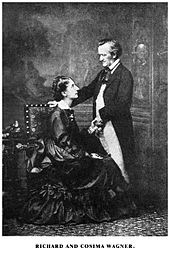
The Bayreuth canon consists of those operas by the German composer Richard Wagner (1813–1883) that have been performed at the Bayreuth Festival.[1] The festival, which is dedicated to the staging of these works, was founded by Wagner in 1876 in the Bavarian town of Bayreuth, and has continued under the directorship of his family since his death. Although it was not originally held annually, it has taken place in July and August every year since the 75th anniversary season in 1951. Its venue is the Bayreuth Festspielhaus, which was built for the first festival.[2] Attendance at the festival is often thought of as a pilgrimage made by Wagner aficionados.[3]
The operas in the Bayreuth canon are the last ten of the thirteen that Wagner completed. He rejected the first three – Die Feen, Das Liebesverbot and Rienzi – as apprentice works.[4][5] Although these have been staged elsewhere and Rienzi was very popular into the early 20th century,[6] the works in the canon exceed them, both in the number of performances given[7] and in the number of available recordings.[8] The term Bayreuth canon is therefore sometimes taken to mean the composer's mature operas.[9] Georg Solti was the first conductor to complete studio recordings of all the works in the canon, starting in 1958 with Das Rheingold and finishing in 1986 with Lohengrin.[9]
- ^ For examples of its usage, see Carnegy (2006) p. 143 or Best (2005) p. 102.
- ^ Sabor (1997) p. 166.
- ^ see Twain (1891) and Laurson (2008) for examples of this comparison.
- ^ Loomis (2008).
- ^ Laurson (2008).
- ^ Palmer (2005).
- ^ Morgan (2005).
- ^ As of 27 December 2009 The Operaclass website Archived 2015-09-24 at the Wayback Machine lists recordings numbered in single figures for each of the three early operas and in the thirties or higher for each of the later ones.
- ^ a b Greenfield (1987).